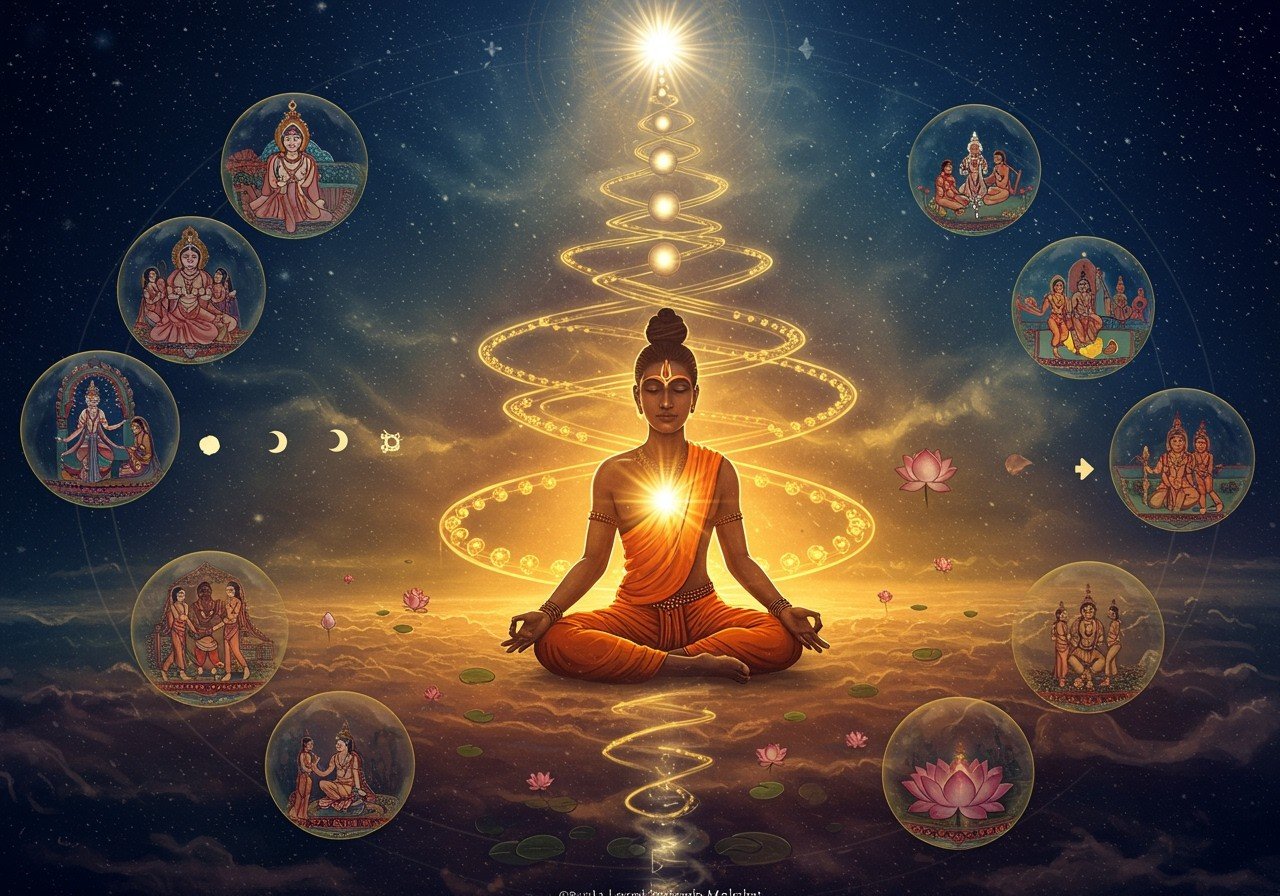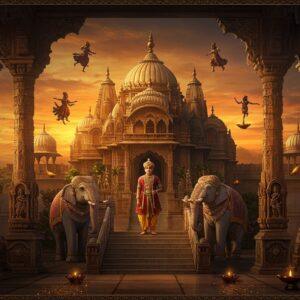
In Hindu philosophy, Moksha and Karma are fundamental concepts intertwined with the cycle of life, death, and rebirth (samsara). These principles offer a profound understanding of the human condition and the path to spiritual liberation. Poojn.in, India’s leading cultural goods and services store, provides resources and products to support your spiritual journey.
Understanding Karma
Karma, meaning “action,” is the principle of cause and effect. Every action, thought, and word generates consequences that can manifest immediately, later in life, or in future lifetimes. Positive actions cultivate positive outcomes, while negative actions lead to negative repercussions. This principle encourages mindful living and performing good deeds with pure intentions. Poojn.in offers a wide selection of incense and camphor to enhance the purity of your spiritual practices and create a sacred atmosphere for reflection and positive karma.
Different types of karma influence our lives:
- Prarabdha Karma: This is the karma manifesting in the present life, derived from past actions. It’s the portion of sanchita karma that is currently unfolding, shaping our present experiences.
- Sanchita Karma: This is the accumulated karma from all past lifetimes. It represents the reservoir of karmic potential that influences our future incarnations.
- Kriyamana Karma: This is the karma we are creating in the present moment through our actions, thoughts, and intentions. It shapes our future experiences and contributes to our overall karmic balance. Every action, thought, and intention contributes to this dynamic force, influencing the unfolding of our destiny.
- Agami Karma: This is the karma that will manifest in the future as a result of our current actions and choices. This type of karma emphasizes the power we have to shape our future lives through conscious decision-making.
The Path to Moksha
Moksha, meaning “liberation,” is the ultimate goal of human life in Hinduism. It signifies freedom from samsara and the attainment of divine bliss. Achieving moksha involves detaching from material desires and realizing one’s true self. You can find sacred texts and meditation accessories at Poojn.in to support your journey towards Moksha.
Several paths (margas) lead to Moksha:
- Karma-marga: The path of selfless action, fulfilling one’s duties without attachment to the results. This involves performing actions with a sense of duty and dedication, rather than for personal gain or recognition. It emphasizes the importance of fulfilling one’s responsibilities in society and family life.
- Jnana-marga: The path of knowledge and wisdom, achieved through self-inquiry and meditation. This path involves deep contemplation on the nature of reality and the self, ultimately leading to self-realization. It emphasizes the importance of understanding the true nature of existence and our place within it.
- Bhakti-marga: The path of devotion and love for a personal God. This involves cultivating a deep and loving relationship with the divine through prayer, worship, and surrender. It emphasizes the importance of faith, love, and devotion as a means of spiritual transformation.
Moksha can be attained in two ways:
- Jivanmukti: Liberation while living, experiencing a state of enlightenment while still embodied. This involves realizing the ultimate truth while still living in the physical world.
- Videhamukti: Liberation after death, achieving final release from samsara upon the death of the physical body. This is the final liberation from the cycle of birth and death after the soul departs from the physical body.
The Interplay of Moksha, Karma, and Samsara
These three concepts are intricately linked. Karma drives samsara, while moksha represents liberation from this cycle. By cultivating positive karma through righteous actions and spiritual practices, one progresses towards moksha. Learn more about Dharma and Karma.
Poojn.in offers a variety of murtis, puja items, and sacred texts that can aid your spiritual practice and deepen your understanding of these concepts. Embrace the wisdom of these ancient teachings to navigate life’s complexities with grace and purpose.
Moksha and Karma in Contemporary Life
While rooted in ancient tradition, moksha and karma remain relevant in modern times. They offer guidance for ethical decision-making, promoting mindful living and encouraging positive contributions to society. Explore Hindu beliefs and practices at Poojn.in.
How Poojn.in Supports Your Spiritual Journey
Poojn.in provides a comprehensive selection of authentic puja items, sacred texts, and spiritual resources to support your exploration of moksha and karma. We offer high-quality products, convenient online shopping, and delivery across India.
Conclusion
Moksha and karma are timeless principles that offer profound wisdom for navigating life’s journey. They encourage self-awareness, ethical conduct, and the pursuit of spiritual liberation. By integrating these concepts into our daily lives, we can strive for a more meaningful and fulfilling existence. Visit Poojn.in to discover resources and products that support your spiritual growth and understanding of these fundamental Hindu principles.


